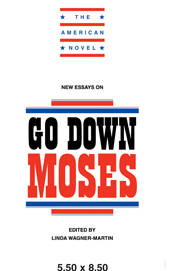Book contents
- Frontmatter
- Contents
- Series Editor's Preface
- 1 Introduction
- 2 Touching Race in Go Down, Moses
- 3 Go Down, Moses and the Discourse of Environmentalism
- 4 Her Shape, His Hand: The Spaces of African American Women in Go Down, Moses
- 5 Who Wears the Mask? Memory, Desire, and Race in Go Down, Moses
- 6 The Game of Courts: Go Down, Moses, Arbitrary Legalities, and Compensatory Boundaries
- Notes on Contributors
- Selected Bibliography
1 - Introduction
Published online by Cambridge University Press: 16 January 2010
- Frontmatter
- Contents
- Series Editor's Preface
- 1 Introduction
- 2 Touching Race in Go Down, Moses
- 3 Go Down, Moses and the Discourse of Environmentalism
- 4 Her Shape, His Hand: The Spaces of African American Women in Go Down, Moses
- 5 Who Wears the Mask? Memory, Desire, and Race in Go Down, Moses
- 6 The Game of Courts: Go Down, Moses, Arbitrary Legalities, and Compensatory Boundaries
- Notes on Contributors
- Selected Bibliography
Summary
GO Down, Moses was published May 11, 1942. Over a year before, in January of 1941, William Faulkner — the author of more than a dozen novels and story collections — had written Harold Ober, his agent, “Thank you for the money. I did not intend the wire to ask for a loan, but I have used the money and I thank you for it. … When I wired you I did not have $15.00 to pay electricity bill with, keep my lights burning” Scarcely eight years after that letter, Faulkner was honored with the most prestigious literary award in the world — the 1949 Nobel Prize for Literature and with it, a check for more than thirty thousand dollars. (He had also been elected to membership in both the National Institute of Arts and Letters and the American Academy of Arts and Letters. From the latter, in 1950, he received the Howells Medal for Fiction, and for his Collected Stones in 1951 he received the National Book Award.) The juxtaposition of these events suggests the vicissitudes that marked Faulkner's career as America's foremost twentieth-century novelist. During the middle period of Faulkner's life, nothing was secure — not literary reputation, or finances, or marriage, or family standing. Yet from the agonized, and agonizing, decade of the author's forties came one of his greatest works — Go Down, Moses.
The novel may have originated from Faulkner's desperate financial straits.
- Type
- Chapter
- Information
- New Essays on Go Down, Moses , pp. 1 - 20Publisher: Cambridge University PressPrint publication year: 1996
- 1
- Cited by

